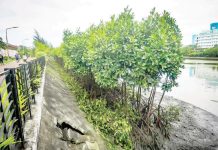ILOILO — A multi-year initiative aimed at protecting Iloilo’s critical watersheds and securing long-term access to clean water was officially launched on July 9, as the Iloilo Water Resilience Initiative (IWARI) Project brought together local officials, environmental experts, and international partners to push for collaborative watershed governance.
Backed by Catholic Relief Services (CRS) Philippines and funded by Coca-Cola Foundation Philippines Inc. (CCPFI), the IWARI Project targets the Tigum-Aganan Watershed and the Iloilo-Batiano River System — two of the province’s most vital water sources — with the goal of enhancing local capabilities in water management and promoting sustainable watershed conservation practices.
The project was formally presented during a courtesy visit to Provincial Administrator Raul Banias, then officer-in-charge of the Office of the Governor. The three-year initiative is implemented by CRS and supported locally by the Provincial Government of Iloilo through the Provincial Environment and Natural Resources Office (PGENRO).
This is a crucial step in ensuring that Iloilo’s communities have access to safe and sufficient water while protecting the ecosystems that provide it, said CRS officials, who emphasized the project’s community-centered and multi-sectoral approach.
CRS leaders Arce Dion Chua and Jerilee Pacheco Cameña led the IWARI delegation, which included CRS Head of Programming Maria Concepcion Nobleza and Water Resources Technical Advisor Alan Luis Silayan. CCPFI was represented by President Cecile Alcantara and Portfolio Manager Monina Pacheco, both of whom expressed strong support for the project’s objectives.
The launch included detailed presentations on the project’s scope, methodology, and desired impact. Mitzi Peñaflorida, forester at Sustainable Environmental Management Services (SvEMS) of PGENRO, provided an overview of Iloilo’s water security challenges and current flagship programs aimed at reforestation, water conservation, and public education.
“The need for coordinated water governance has never been more urgent,” Peñaflorida said, citing environmental pressures and increasing demand for water resources.
Meanwhile, Noemie Magullado, Municipal Environment and Natural Resources Officer for Maasin, shared insights from the ground, showcasing how local communities are already taking action to conserve watersheds and manage resources through grassroots initiatives.
Stakeholders highlighted the importance of engaging technical personnel, government units, and civil society in the collaborative management of the watersheds. They also stressed that long-term sustainability depends on the integration of local knowledge, environmental science, and policy support.
The IWARI Project reflects the province’s growing focus on environmental resilience in the face of climate change and water scarcity, and is expected to serve as a model for community-driven water governance across the country./PN




